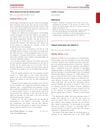 October 2024 in “Frontiers in Neurology”
October 2024 in “Frontiers in Neurology” Interventional embolization is effective for treating scalp arteriovenous fistula but can cause complications like swelling and hair loss.
 1 citations,
April 2017 in “European Psychiatry”
1 citations,
April 2017 in “European Psychiatry” A patient's allergic reaction to clozapine resolved without stopping the medication, showing the importance of blood monitoring.
 March 2018 in “International journal of basic and clinical pharmacology”
March 2018 in “International journal of basic and clinical pharmacology” Carboplatin-paclitaxel is preferred for advanced lung cancer due to its balance of affordability and patient well-being.
 February 2024 in “BioMetals”
February 2024 in “BioMetals” Heavy metals like arsenic, cadmium, and lead can increase cancer risk and worsen outcomes.

More research is needed to understand chemotherapy-induced hair loss and its phases.
 September 2017 in “Journal of Investigative Dermatology”
September 2017 in “Journal of Investigative Dermatology” Injections of special skin cells showed potential in treating hair loss, with some participants experiencing increased hair density.
 7 citations,
December 2011 in “Elsevier eBooks”
7 citations,
December 2011 in “Elsevier eBooks” The document concludes that early diagnosis and treatment are crucial for managing skin diseases in ferrets.

Teprotumumab for thyroid eye disease commonly causes fatigue, brittle nails, dry eyes, hair loss, muscle spasms, and dry mouth, with rare serious events like blood clots.
 179 citations,
September 1998 in “BMJ”
179 citations,
September 1998 in “BMJ” Hair loss in men is common, treatable, but not curable.
 9 citations,
January 2020 in “Postepy Dermatologii I Alergologii”
9 citations,
January 2020 in “Postepy Dermatologii I Alergologii” Frontal fibrosing alopecia is a poorly understood condition with increasing cases and unclear treatment effectiveness.
 19 citations,
September 2017 in “The Journal of urology/The journal of urology”
19 citations,
September 2017 in “The Journal of urology/The journal of urology” Poor sleep is linked to a higher risk of developing and worsening urinary problems in men.
 12 citations,
January 2016 in “Skin appendage disorders”
12 citations,
January 2016 in “Skin appendage disorders” Hair restoration surgery can potentially treat primary scarring alopecias, but it's important to start early medication, ensure patient remission before transplant, and monitor after surgery.
 3 citations,
February 1976 in “Pediatric Clinics of North America”
3 citations,
February 1976 in “Pediatric Clinics of North America” The conclusion is that effective cancer treatment often requires a combination of therapies, but must be carefully managed due to serious side effects and the risk of immunosuppression.
 20 citations,
January 2013 in “Evidence-based complementary and alternative medicine”
20 citations,
January 2013 in “Evidence-based complementary and alternative medicine” TGPC plus CGT is effective and safe for treating severe alopecia areata in children.
 60 citations,
January 2014 in “Anais Brasileiros De Dermatologia”
60 citations,
January 2014 in “Anais Brasileiros De Dermatologia” Nanotechnology in dermatology shows promise for better drug delivery and treatment effectiveness but requires more safety research.
 67 citations,
January 2022 in “Theranostics”
67 citations,
January 2022 in “Theranostics” Advanced nanocarrier and microneedle drug delivery methods are more effective, safer, and less invasive for treating skin diseases.
 21 citations,
April 2010 in “Veterinary Dermatology”
21 citations,
April 2010 in “Veterinary Dermatology” Hydroxychloroquine showed some potential, but overall, the three drugs had limited success in treating lupus in dogs.
April 2023 in “Medizinische Genetik” Male-pattern hair loss is largely influenced by genetics, with key genes identified.
 2 citations,
April 2016 in “Más dermatología”
2 citations,
April 2016 in “Más dermatología” The supplement with Serenoa repens and Pygeum africanum significantly increased active hair growth and decreased rest phase hair in post-menopausal women with hair loss, with only mild digestive side effects.
 April 2023 in “Medizinische Genetik”
April 2023 in “Medizinische Genetik” New research has found 14 genes linked to the risk of developing alopecia areata, improving understanding and treatment options.
 18 citations,
February 2014 in “PubMed”
18 citations,
February 2014 in “PubMed” Androgenetic alopecia is a common hair loss condition caused by testosterone effects on hair follicles, leading to thinner, shorter, and less pigmented hair, diagnosed using scalp dermoscopy and treated with topical minoxidil, antiandrogen agents, and 5-alpha reductase inhibitors.
 1 citations,
October 2023 in “BMC oral health”
1 citations,
October 2023 in “BMC oral health” Two patients treated with TAC for mouth fibrosis improved but developed Cushing's Syndrome symptoms.
 75 citations,
December 2011 in “British Journal of Dermatology”
75 citations,
December 2011 in “British Journal of Dermatology” Female pattern hair loss can be treated with medications, surgery, and cosmetic products, considering its psychological impact.
8 citations,
January 2019 in “International Journal of Trichology” Early diagnosis and a combination of treatments, including minoxidil and finasteride, are recommended for managing hair loss in India.
 28 citations,
January 1989 in “Toxicologic Pathology”
28 citations,
January 1989 in “Toxicologic Pathology” Minoxidil may cause heart changes; use caution and monitor patients with heart conditions.
38 citations,
August 1999 in “New England journal of medicine/The New England journal of medicine” Indinavir can cause hair loss and other skin problems.
12 citations,
February 2017 in “Journal of neuroscience research” Removing certain brain receptors in mice worsens seizure severity and response to treatment during hormone withdrawal.

Hair follicles can be used to quickly assess drug effects in cancer treatment.
 July 2012 in “British Journal of Dermatology”
July 2012 in “British Journal of Dermatology” Women generally want more hair volume, which becomes a concern around menopause due to hair loss.
 July 2012 in “British Journal of Dermatology”
July 2012 in “British Journal of Dermatology” Hair loss treatments show limited improvement, sunscreen thickness affects vitamin D production, and the effectiveness of IVIg for toxic epidermal necrolysis is uncertain.

























